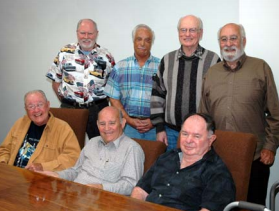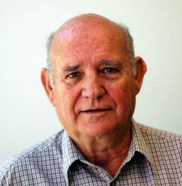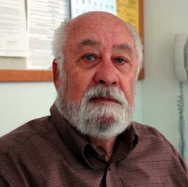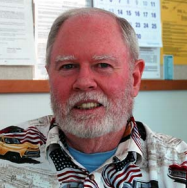
Members of the San Jose Chapter remain engaged in
the issues, knowing that a united front is their best
hope for constructive change.
Members of the San Jose Chapter of the Local 1245 Retirees Club spoke about the value of benefits at their April meeting. Whether they retired three years ago, or 23 years ago, they recognize that life isn’t quite the same when your medical bills start going up but your benefits don’t.
And they hope that IBEW members still on the job will give the matter serious consideration if PG&E and Local 1245 reach agreement at the bargaining table on reining in medical costs. They know working members are the ones who will make the final decision when it comes to vote.
 “We don’t get to do much anymore—health premiums take so much out of your check. You can’t do the things you’d like to do. We pay between $400 and 500 a month on medical. We’re fortunate, we had some savings. People with a lot of doctor bills are hurting. Get something done about the price we have to pay for medical insurance. It’s killing a lot of people. Younger workers should go for benefits instead of the money. It’s the same as money in the pocket—it’ll help you when you get older.”
“We don’t get to do much anymore—health premiums take so much out of your check. You can’t do the things you’d like to do. We pay between $400 and 500 a month on medical. We’re fortunate, we had some savings. People with a lot of doctor bills are hurting. Get something done about the price we have to pay for medical insurance. It’s killing a lot of people. Younger workers should go for benefits instead of the money. It’s the same as money in the pocket—it’ll help you when you get older.”
Watie Anthney, PG&E Dispatcher in Cupertino, 36 years on the job, retired 1990
 “We live from paycheck to paycheck. We put no money away for emergencies. We were notified a couple months ago that we were getting a 5% raise. But I’m making $50/month less because of the medical. A $1300 pension was fine when I retired, but it’s not enough now, not with medical costs going up. I retired at 62 but I wish now I had worked longer. People now are living longer. I suggest (to working members), ‘Work as long as you can—all costs keep going up.’ We may be in a recession but our living costs aren’t going down, they’re going up.”
“We live from paycheck to paycheck. We put no money away for emergencies. We were notified a couple months ago that we were getting a 5% raise. But I’m making $50/month less because of the medical. A $1300 pension was fine when I retired, but it’s not enough now, not with medical costs going up. I retired at 62 but I wish now I had worked longer. People now are living longer. I suggest (to working members), ‘Work as long as you can—all costs keep going up.’ We may be in a recession but our living costs aren’t going down, they’re going up.”
Bob Leal, PG&E Clerk II, 32 years on the job, retired 1986
 “I’d like to see medical premiums come down. I’m looking at it from being four years retired. But I’m also looking at those guys been retired 15-20 years—they’re making half what I am. When I was 21-22 I was thinking about myself and my family and taking care of them. So I have a difficult time asking active members to help now. I do hope the active employees can see the light, and help themselves and help us, too.”
“I’d like to see medical premiums come down. I’m looking at it from being four years retired. But I’m also looking at those guys been retired 15-20 years—they’re making half what I am. When I was 21-22 I was thinking about myself and my family and taking care of them. So I have a difficult time asking active members to help now. I do hope the active employees can see the light, and help themselves and help us, too.”
Robert Smethurst, PG&E T-Man, 51 years on the job, retired 2005
 “I got $1600 a month pension in 1992. I got one raise of 2%. My pension has gone down to $1100 because of the increase in the medical plan. That’s the hardest thing to cope with—it goes up every year. I’m paying about $500 a month. I’d like to see the company pick up more of the medical plan. I don’t think it’s fair the retiree pays all of the increase. I never even thought about retirement. When I retired everything I had was paid for and I had a few bucks saved. But when premiums went up every year it ate into my retirement. Benefits is money in the pocket. That’s the bottom line, really.”
“I got $1600 a month pension in 1992. I got one raise of 2%. My pension has gone down to $1100 because of the increase in the medical plan. That’s the hardest thing to cope with—it goes up every year. I’m paying about $500 a month. I’d like to see the company pick up more of the medical plan. I don’t think it’s fair the retiree pays all of the increase. I never even thought about retirement. When I retired everything I had was paid for and I had a few bucks saved. But when premiums went up every year it ate into my retirement. Benefits is money in the pocket. That’s the bottom line, really.”
Ernie Amaral, PG&E Working Foreman—Electric, 37 years on the job, retired 1992
 “I’m involved with a lot of retiree groups. I run into a lot of people who are really really feeling the pinch, people who are just barely able to make it. I’m looking at people who don’t have a COLA, so they’re not keeping up with increasing costs… Active employees don’t realize now what it’s going to cost them later.”
“I’m involved with a lot of retiree groups. I run into a lot of people who are really really feeling the pinch, people who are just barely able to make it. I’m looking at people who don’t have a COLA, so they’re not keeping up with increasing costs… Active employees don’t realize now what it’s going to cost them later.”
Bill Wallace, former Local 1245 Advisory Council representative from the South Bay, retired from City of
Santa Clara
 “Probably sooner than you realize, you’ll be retired and it’s not always easy to take a 50% cut in pay. I got one 3% raise since 1995, and that’s not going to keep you on pace. When you’re working you have a mortgage and you want the money, but when you retire you find the benefits are important—like the RPOA (Retirement Premium Offset Account). You give up your body physically (on the job), it’s a cumulative thing. When you start to have operations after you retire you begin to see the value of the benefits.”
“Probably sooner than you realize, you’ll be retired and it’s not always easy to take a 50% cut in pay. I got one 3% raise since 1995, and that’s not going to keep you on pace. When you’re working you have a mortgage and you want the money, but when you retire you find the benefits are important—like the RPOA (Retirement Premium Offset Account). You give up your body physically (on the job), it’s a cumulative thing. When you start to have operations after you retire you begin to see the value of the benefits.”
Al Randall, PG&E Inspector, Electric Dept., retired 1995